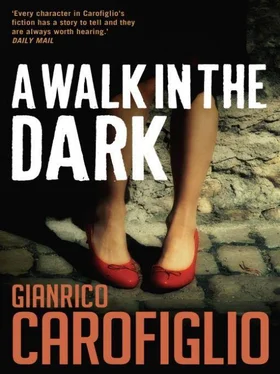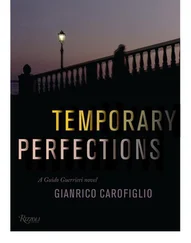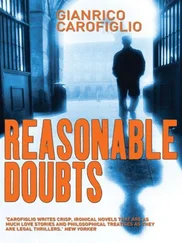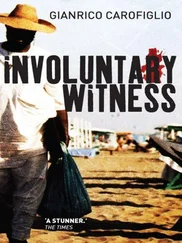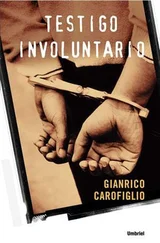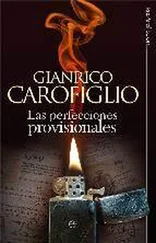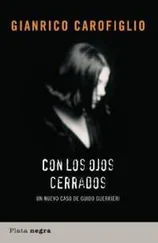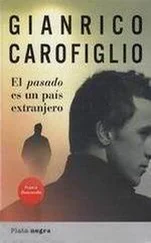Gianrico Carofiglio - A Walk in the Dark
Здесь есть возможность читать онлайн «Gianrico Carofiglio - A Walk in the Dark» весь текст электронной книги совершенно бесплатно (целиком полную версию без сокращений). В некоторых случаях можно слушать аудио, скачать через торрент в формате fb2 и присутствует краткое содержание. Жанр: Криминальный детектив, на английском языке. Описание произведения, (предисловие) а так же отзывы посетителей доступны на портале библиотеки ЛибКат.
- Название:A Walk in the Dark
- Автор:
- Жанр:
- Год:неизвестен
- ISBN:нет данных
- Рейтинг книги:5 / 5. Голосов: 1
-
Избранное:Добавить в избранное
- Отзывы:
-
Ваша оценка:
- 100
- 1
- 2
- 3
- 4
- 5
A Walk in the Dark: краткое содержание, описание и аннотация
Предлагаем к чтению аннотацию, описание, краткое содержание или предисловие (зависит от того, что написал сам автор книги «A Walk in the Dark»). Если вы не нашли необходимую информацию о книге — напишите в комментариях, мы постараемся отыскать её.
A Walk in the Dark — читать онлайн бесплатно полную книгу (весь текст) целиком
Ниже представлен текст книги, разбитый по страницам. Система сохранения места последней прочитанной страницы, позволяет с удобством читать онлайн бесплатно книгу «A Walk in the Dark», без необходимости каждый раз заново искать на чём Вы остановились. Поставьте закладку, и сможете в любой момент перейти на страницу, на которой закончили чтение.
Интервал:
Закладка:
Before we got back in the van I found a litter bin and threw away the cigarettes and the lighter.
Claudia said she would drive, and she got me back home in less than an hour.
She held my hand again for a while, before she said goodbye. Outside, the night was starting to be less dark.
When I got in, the first thing I did was clean my teeth, to take away the taste of the cigarettes.
Then I opened all the windows, took out an old, rare vinyl disc and put it on the turntable.
The cool wind of dawn was blowing through the apartment, and I leaned back in the rocking chair just as the first crackly notes rang out.
Albinoni’s famous adagio. Over those notes, as if coming from another dimension, the mysterious speaking voice of Jim Morrison.
34
Scianatico was arrested for kidnapping and murder. And resisting a police officer of course, since, according to the written statements, he’d tried to fight the policemen who were bursting into the apartment to arrest him.
According to the autopsy, Martina had died from a number of violent blows – punches, probably – to the head and a knock against a hard surface. A wall or the floor. The medical expert said that Martina was probably still alive when she was dragged into the building and then into the apartment.
In the trial that followed with unusual haste, Scianatico was again defended by Delissanti, who tried everything he could to have him declared incapable of understanding and free will. His expert witness mentioned a psychotic imbalance that had triggered the attack and the murder, a failure to process feelings of grief for the end of the relationship, a serious depressive syndrome when the patient realized what he had done, and a whole lot of bullshit like that. Scianatico tried to confirm the diagnosis with two highly dubious suicide attempts in prison.
But the court-appointed psychiatrist didn’t buy it. He said the two suicide attempts were simulated acts and concluded his evaluation with the comment that the defendant was an individual with “… a compulsive need for control, a very low tolerance for frustration, a borderline personality structure, and a narcissistic disorder… but technically capable of understanding (in the sense of being perfectly aware of the significance of his actions) and free will (in the sense of being able to make decisions freely and to choose his own behavioural patterns) ”.
And so, after a three-month trial covered in relentless detail in the newspapers and on television, Scianatico was found capable of understanding and free will and was sentenced to sixteen years’ imprisonment, the charge of voluntary homicide being reduced to one of manslaughter. In plain language: he went there to beat her up but didn’t intend to kill her.
Technically, a correct decision, but the first thing I thought when I read the news in the papers was that the bastard would be out on day release within seven or eight years. Provided they didn’t reduce his sentence at the court of appeal.
But the court of appeal didn’t give him any more reductions. In such a notorious case, with so much media attention, nobody wanted to risk being accused of favouritism towards Judge Scianatico’s son.
Actually, that was former Judge Scianatico’s son. The old man had taken leave of absence immediately after the murder and then, without ever returning to work, retired.
Caldarola never saw our civil case through to the end. A few months after the final events he was transferred to the court of appeal, and so the trial had to start again with another judge. This time, Delissanti chose what you might call a tamer line of defence. With the murder trial in progress, it was not in their best interests to go over, yet again, the things Scianatico had done before, especially with the journalists making so much noise. It was not in their best interests to talk about the fights, the violent sex, the harassment, the stalking, or the things the murder victim had been subjected to in the months and years before she became a murder victim. So at the first hearing they calmly plea bargained and managed to get six months’ imprisonment.
The disciplinary proceedings against me were shelved. There too it was in nobody’s interests to go over the whys and wherefores of a case that had ended the way it had. Not even mine. The ruling, which was quite brief, said that I had not committed any disciplinary offence, but had simply “interpreted with vigour, but within the limits of ethical correctness, the mandate of counsel for the plaintiff”.
Alessandra Mantovani has stayed in Palermo. When the assignment was nearly over, she asked for, and obtained, a permanent transfer. Now she works in the anti-Mafia department and every now and again I read her name, and see her photograph – her face looking tired and hardened – in some newspaper. It always gives me a curious twinge of sadness. Like the one I felt when she told me she was leaving.
Claudia, on the other hand, has stayed in Bari. She still runs the refuge but has stopped calling herself Sister. Not that she ever held a press conference or put up posters to tell everyone she wasn’t a nun.
Whenever a new girl arrives in the community, she simply introduces herself with her name and that’s it. If anyone who knew her before calls her “Sister”, she tells them just her name will be fine. In other words, Claudia.
Which isn’t the name she has on her papers, but that doesn’t really matter. Her real name is Claudia. The name on her papers was given to her by her natural parents. If you can apply the word natural to a father who does things like that to his little girl and a mother who lets him do it, pretending she doesn’t see or hear a thing.
Her real mother, her only family, had been Sister Caterina, in the reformatory.
35
When I told Margherita that I’d like to take up parachuting, she looked at me for a long time without saying anything. “Was I trying to show her I could still surprise her?” she asked when she got the power of speech back. If so, I’d succeeded.
A few days later I started the course.
During those weeks I felt a very strange sensation I’d never known before, a mixture of definite fear and unsettling serenity. A sense of the inevitable and a mysterious dignity.
The night before the jump, I didn’t sleep a wink. Obviously.
But I stayed in bed all night, wide awake, thinking about many things, remembering many things. The most vivid of all was that terrible children’s game on the ledge, so many years ago.
Every now and again a wave of absolutely pure fear swept over me. I let it flow through my body, like a current of energy, until it had passed. Sometimes these waves were stronger, and lasted for a longer time. Sometimes I thought I was going to die the next day. Sometimes I thought I’d pull out at the last moment. But that too passed.
If Margherita noticed I hadn’t slept, she didn’t say anything in the morning.
Strangely, I didn’t feel tired. On the contrary, my arms and legs felt loose and my mind clear and clean. I wasn’t thinking about anything.
The deafening noise of the plane dropped until it became a kind of background rumble. Powerful but contained, in the half-light of the cockpit. The pilot had reduced speed to the minimum and it almost seemed as if the plane was suspended between the earth and the sky.
There were six of us due to jump. I and three others would go first. Then the instructor and Margherita, who had asked to be there and had told me about it only that morning.
When the hatch was thrown wide open the wind rushed in, and the light was unsettling.
I was very close to the mystery of life and death.
The instructor told me to place myself across the opening, as I had been taught. I did as I was told. A few seconds passed and he signalled to me to jump. I looked down and didn’t move. It was like an endless scene in slow motion, developed frame by frame. I stood there motionless. He repeated that I should jump, but I didn’t move. Everything was absurdly still.
Читать дальшеИнтервал:
Закладка:
Похожие книги на «A Walk in the Dark»
Представляем Вашему вниманию похожие книги на «A Walk in the Dark» списком для выбора. Мы отобрали схожую по названию и смыслу литературу в надежде предоставить читателям больше вариантов отыскать новые, интересные, ещё непрочитанные произведения.
Обсуждение, отзывы о книге «A Walk in the Dark» и просто собственные мнения читателей. Оставьте ваши комментарии, напишите, что Вы думаете о произведении, его смысле или главных героях. Укажите что конкретно понравилось, а что нет, и почему Вы так считаете.
